—story by Ross Courtney
—photos by TJ Mullinax and Ross Courtney
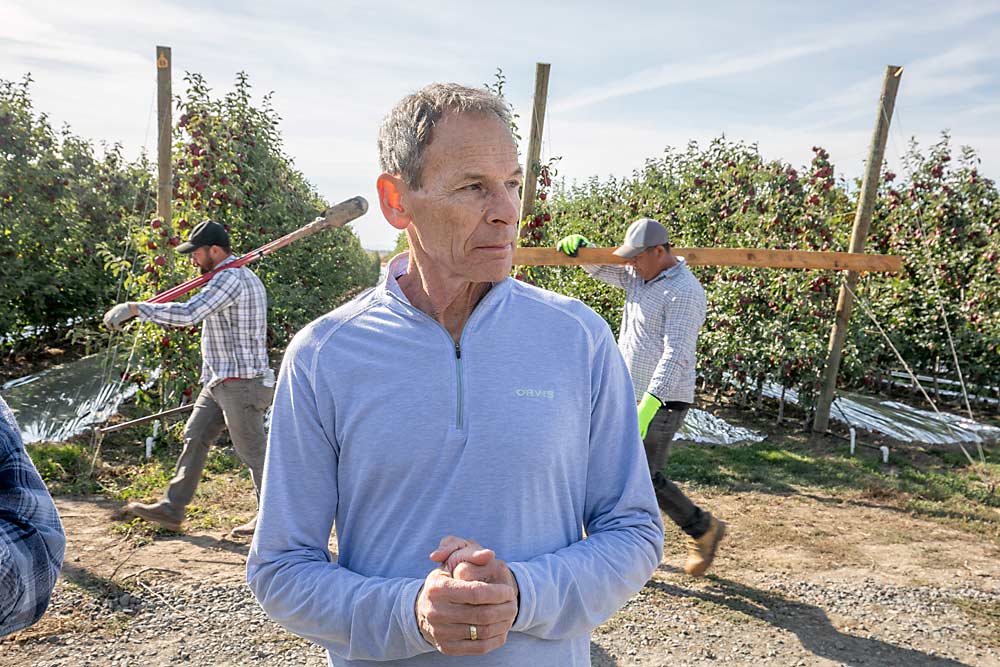
Let’s get one thing out of the way: Tom Gausman is a nice guy. Everyone says so — clients, researchers, co-workers, competitors.
He’s so humble and unassuming.
He always asks what I think, even though he has more experience.
I never saw a person so polite, never upset about anything.
It takes a lot to make him mad, and believe me, I’ve tested him. (That’s from his wife, Tracy.)
Gausman, 71, has built a career out of being “nice,” mixing what business classes call emotional intelligence with old-fashioned hard work and horticultural expertise honed from decades spent building one of Washington’s largest orchard management companies.
Now, as he transitions to retirement from his role as vice president of AgriMACS in Chelan, Good Fruit Grower’s advisory board has named Gausman the 2024 Grower of the Year. The award honors innovative and inspiring growers, recognizing their efforts as good employers, good stewards of the land and good partners to the wider industry.
Gausman’s career trajectory tracks a changing industry: from his roots on a small family farm to redefining what it means to be a grower in a consolidating industry where orchard owners aren’t always putting their boots on the ground. Highlighting his quiet leadership and communication skills, the advisory board noted how those skills helped him build a team that produces quality fruit for warehouses across the state on behalf of investors across the country.
He’s quick to give credit to that team, but their success is also a credit to his leadership.
“If we have a successful orchard management business, a big part of it is the people we’re able to attract to us,” Gausman said.
History
Gausman grew up on a 35-acre apple orchard during a time when his family of six could live off such a small parcel, tucked against a rocky hillside just south of Oroville on the east side of the Okanogan River.
All the kids helped. Vacations were camping trips. Wages from summer and fall orchard work almost paid for a semester of college.
“You couldn’t begin to do that now,” said Eleanor Gausman, Tom’s mother, who came from a warehouse-owning orchard family that was part of a network of small farms, warehouses and cooperatives in the 1970s Okanogan Valley heyday.
Gausman appreciated his rural upbringing, but he saw times changing. Warehouses began closing, and consolidation began taking its toll on the community and his family. His parents farmed mostly full time, but his mom, a registered nurse, took occasional hospital shifts to make ends meet.
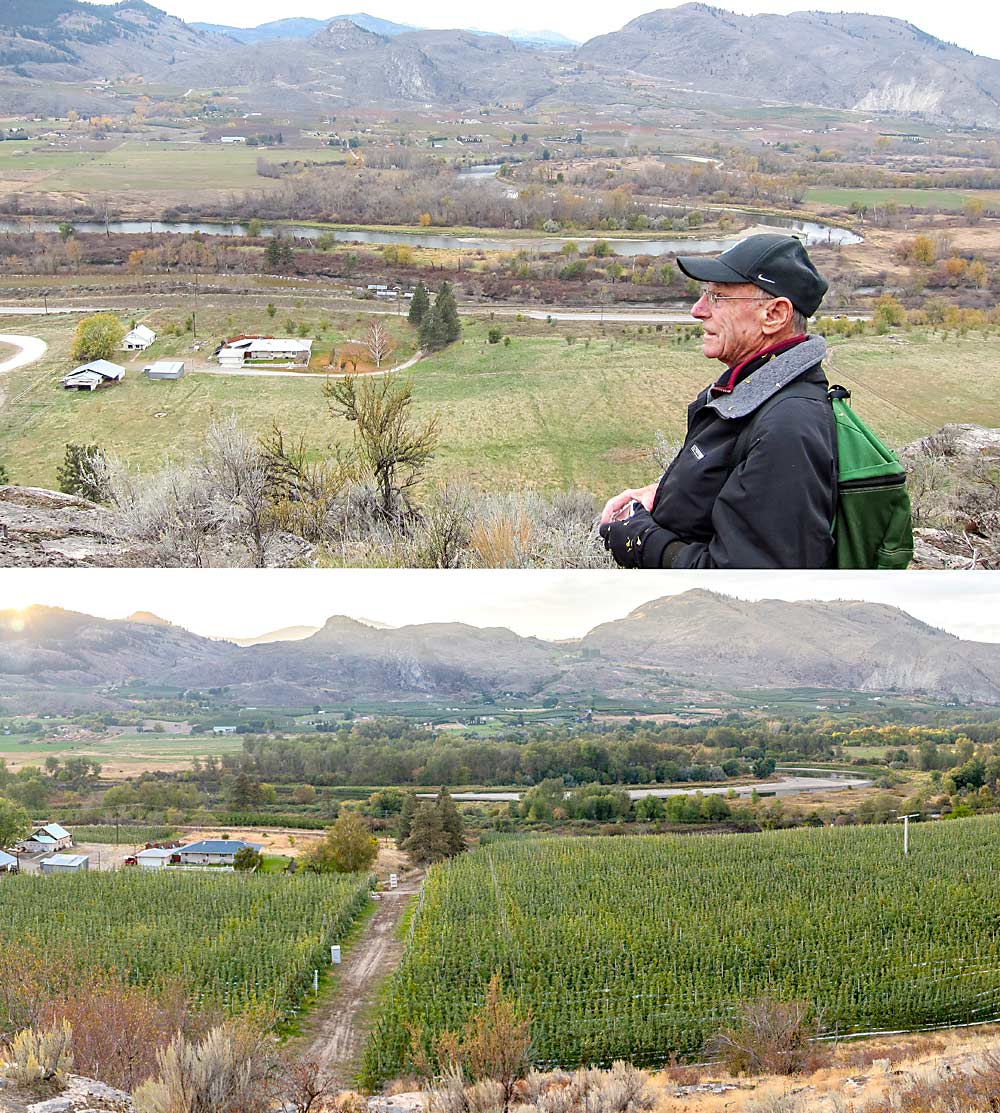
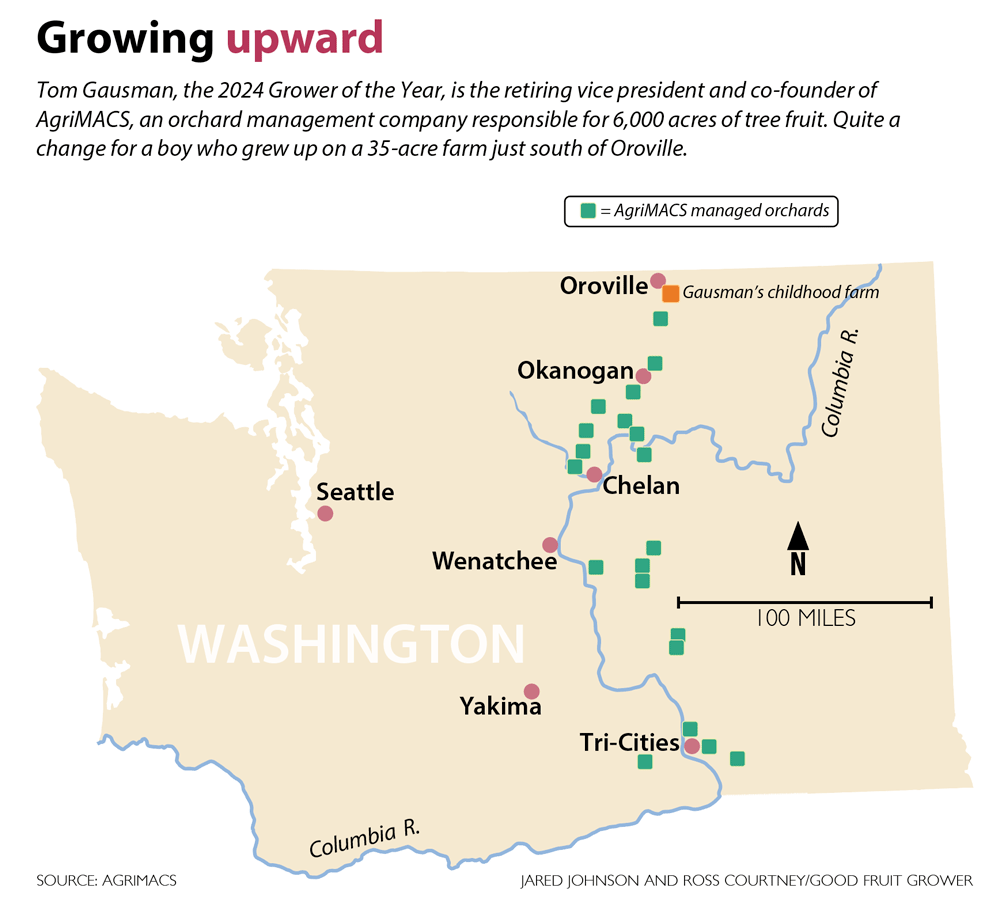
He liked horticulture, though, and after a stint as a ski bum in Idaho, he enrolled at Washington State University and earned a bachelor’s degree in tree fruit production in 1977. He took classes in nursery management, too.He first worked in Skagit County in vegetables, then in an ornamental plant nursery.
His first tree fruit job came in the 1980s as a field representative for a Wenatchee packing company. After 10 years, he joined a vertically integrated producer’s management team, tasked with building a stable of outside growers and managing some captive orchards.
A few years later, the company sold to Dole, but he kept his job. That’s where he met Tim McLaughlin, his eventual business partner.
Besides operating farms, Dole facilitated outside investment. Involved with some of the deals, McLaughlin and Gausman unknowingly began to build their business plan. One of the investors suggested the two friends start a management team independent of packing houses. They talked about it with their families and at first “chickened out,” McLaughlin said.
As the century closed, however, Dole began to sell off properties, so the two founded AgriMACS in 2000. McLaughlin, who had a real estate license and business acumen, served as president; the horticultural expert Gausman was vice president.
“It was a golden opportunity,” Gausman said.
At the time, outside investment flew “kind of under the radar,” McLaughlin said. A few equity groups and insurance companies owned orchards. Even the state Department of Natural Resources invested in farming to help fund public schools. When it started, AgriMACS joined a small cadre of management firms in Washington, such as Stemilt Management, Clark Jennings and Associates and C.M. Holtzinger.
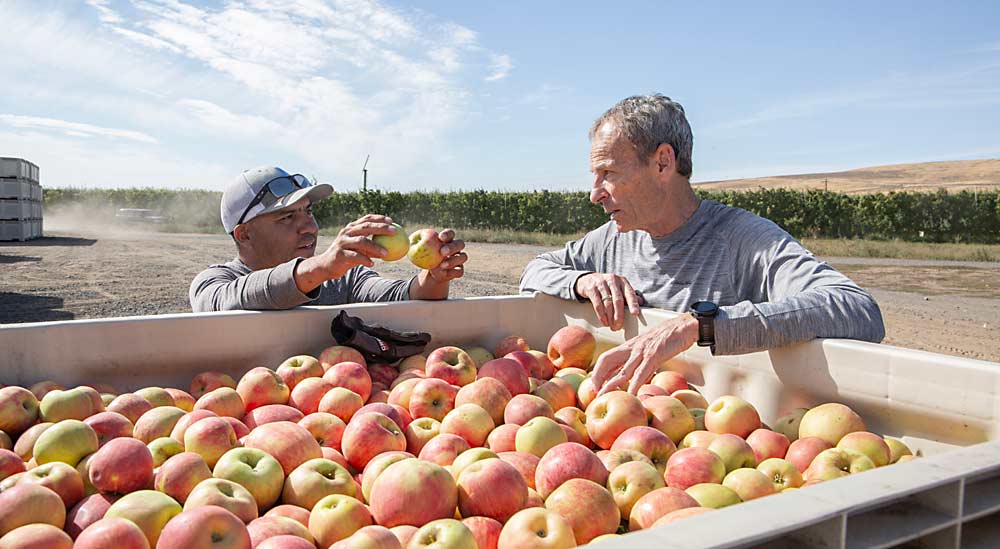
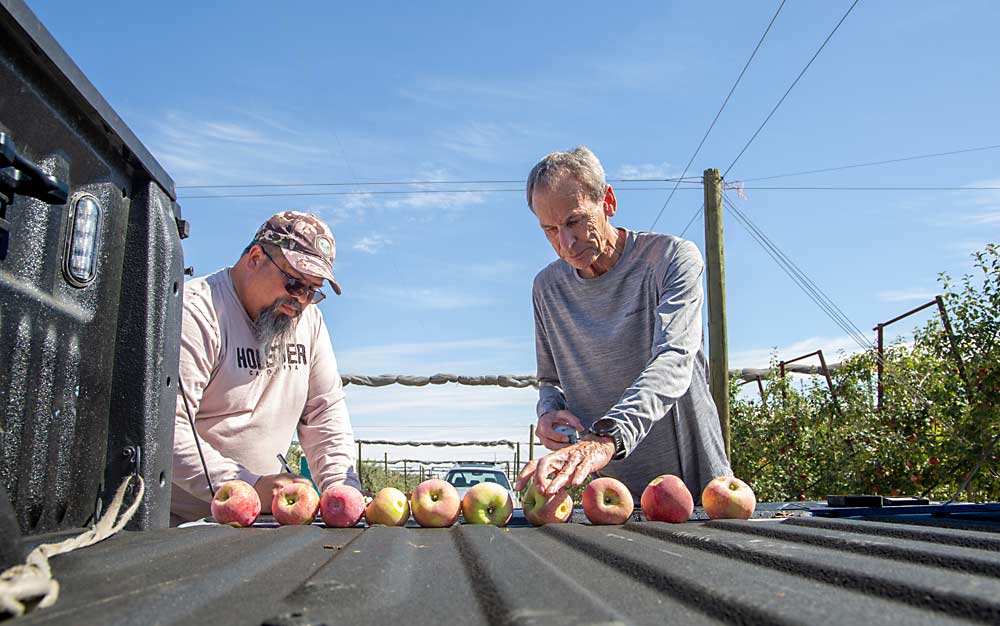
Scale and soft skills
The new business introduced Gausman to scale.
He had grafted and replanted small blocks, but investment firms hired AgriMACS to carve orchards into raw ground hundreds of acres at a time, sometimes with only months of notice. Gausman established a reputation as a meticulous planner, hard worker and sound collaborator.
Some projects have been tough, built on ground he didn’t necessarily choose, but they all turned out clean and productive, said Jeff Cleveringa, a member of Good Fruit Grower’sadvisory board.
“He takes care of it like it’s his own,” Cleveringa said.
Cleveringa called Gausman a quiet contributor, willing to learn and share. Even as he transitions to retirement, he continues to participate in tours and industry meetings. He hosted a 2022 International Fruit Tree Association tour stop and was frank about the challenges of crop load management for Honeycrisp. Gausman also has served on Washington Tree Fruit Research Commission committees, as president of the North Central Washington Fieldman’s Association and as chair of the industry’s apple maturity program, a group of horticulturists who made statewide harvest timing recommendations.
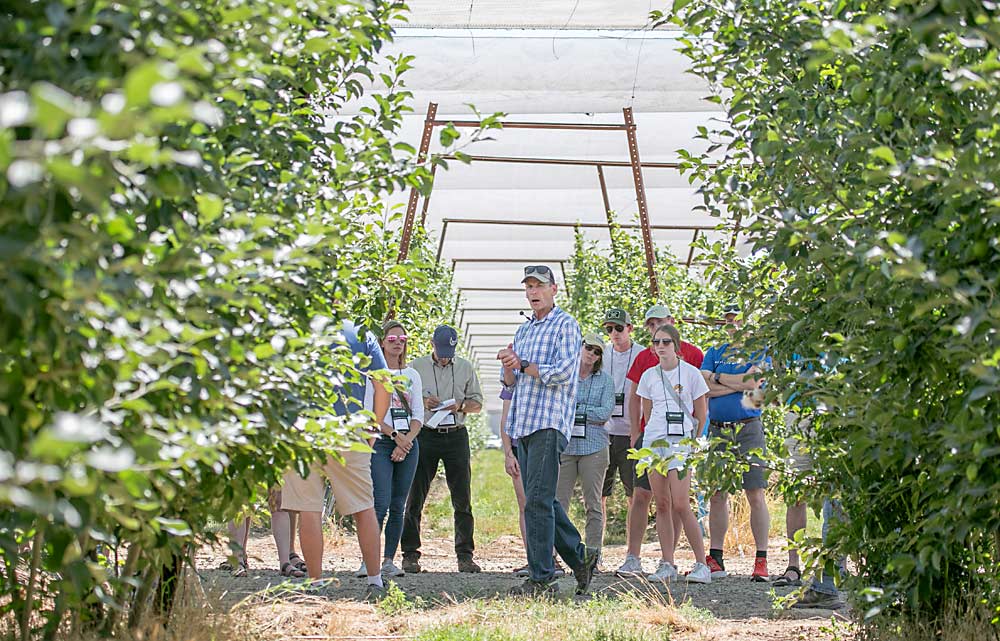
“It was easier when the state had only two varieties,” he said with a laugh.
Stefano Musacchi of Washington State University calls Gausman a skilled horticulturist.
As Musacchi taught growers “click” pruning for WA 38, the variety sold as Cosmic Crisp, he hinted to Gausman the technique might work on SugarBee, a cultivar with similar Type 4 growth habits. Click pruning is “not intuitive,” Musacchi said; applying it to a different variety took guts and skill.
Gausman also collaborated with Musacchi on a research commission-funded project about plant growth regulators. Giving a research team randomized blocks for trials causes disruption, but Gausman and the AgriMACS team handled that patiently and proactively, Musacchi said.
The future
Gausman exits the industry during times tough economically but exciting technologically.
On the economic outlook, he favors bringing back some form of collective domestic marketing and expects more painful consolidation over the next five years.
As for tech, he believes robots will pick fruit … someday.
Meanwhile, he is a fan of labor apps and NDVI aerial scanning. One year, his management team relied on the imaging to identify areas of high vigor and, therefore, large cherry size.
The company also uses automated irrigation systems from Phytech and Wilbur-Ellis. So far, AgriMACS lets orchard managers pick the systems.
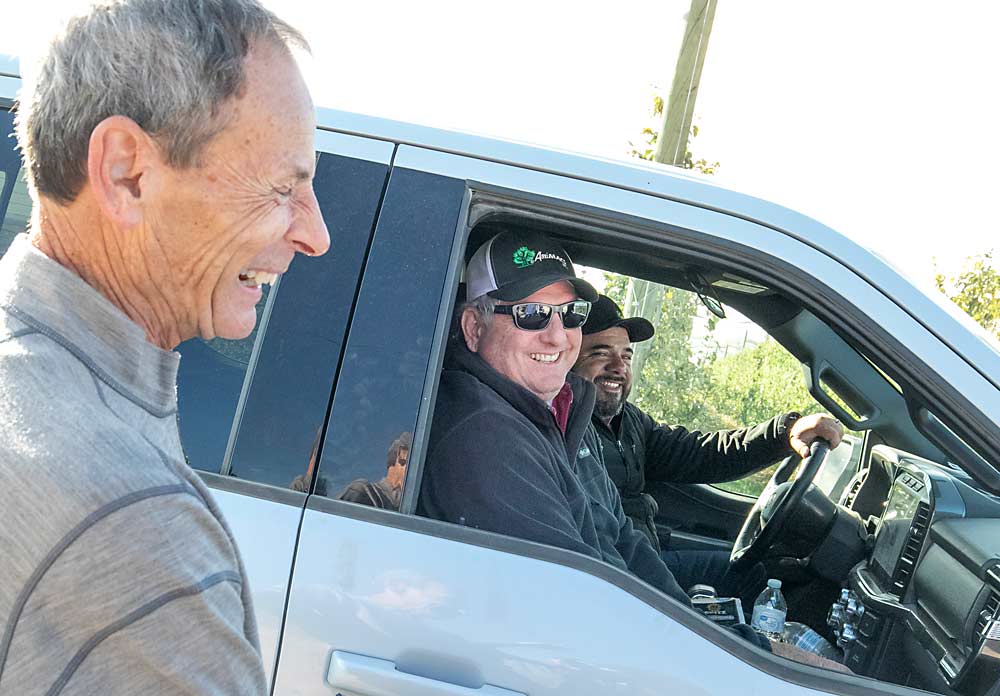
“What’s more important is that the guys using it know it, understand it, are comfortable with it — more so than which one’s better,” Gausman said.
Today, the challenge is picking technology that will pay off. Gausman and AgriMACS have tested Monarch tractors and eyed Smart Apply sprayers and the Prospr self-driving sprayer. His clients are curious, too, but want to wait out the economic doldrums before buying expensive tools.
Those new technologies, and their associated price tags, are just one more thing that makes it harder for small farms to compete with corporate and investor-backed farms. But Gausman’s parents don’t lament that their son didn’t keep the family farm. Rather, they laud outside investment and his role in the innovation it has brought to the industry.
“He’s been very successful in what he is doing,” Ken Gausman said. “He has done a very good job.” •






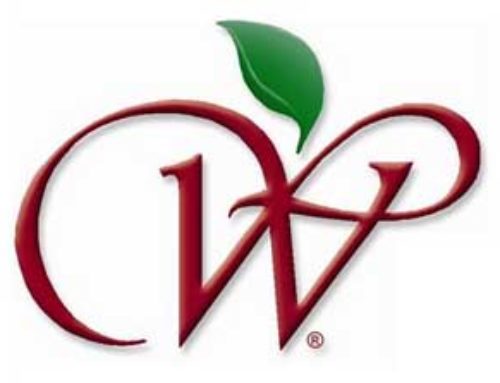
An excellent synopsis of our fabulous fruit growing country & its astute, innovative managers like Tom & Tim, who just happens to be my son!👏🏻🧑🏻🎄
Wonderful article, thank you for sharing this heartwarming work. This is an example of people recognizing all Tom has done for the Apple industry both personally and professionally. It is moving reading about people remembering how Tom has made them feel. Based on what folks say about him, it’s clear he has made a lasting impression interpersonally and in several industries. Well done Tom!